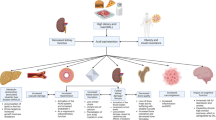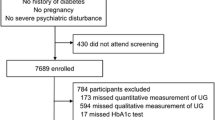Abstract
Several studies have observed an inverse association between serum magnesium and fasting glucose levels. However, there have been sparse data on Koreans. The present study was designed to evaluate the association between serum magnesium and fasting serum glucose levels in Korean adults. A total of 949 Korean adults who visited an outpatient at a university hospital were included in this study. We compared mean values of clinical data according to the tertile of serum magnesium level using analysis of covariance. Association between serum magnesium and fasting glucose levels was evaluated using multiple regression analysis. Odds ratio (OR) was calculated to determine the association between hypomagnesemia and abnormal glucose metabolism. Fasting serum glucose levels decreased significantly from the lowest to the highest tertile of serum magnesium level (108.0 ± 1.4, 106.5 ± 2.1, 102.5 ± 1.7 mg/dl, respectively, p = 0.015), whereas blood pressure and lipid profile showed no significant associations. Serum magnesium level was negatively associated with fasting serum glucose level (β = −0.114, p = 0.001). Participants with hypomagnesemia had significantly higher OR for abnormal glucose metabolism compared to those with normomagnesaemia (OR = 2.28, 95%CI 1.29–4.02). There was a negative association between serum magnesium and fasting glucose levels in Korean adults. In addition, hypomagnesemia was associated with abnormal glucose metabolism.
Similar content being viewed by others
References
Djurhuus MS, Henriksen JE, Klitgaard NA et al (1999) Effect of moderate improvement in metabolic control on magnesium and lipid concentrations in patients with type 1 diabetes. Diab Care 22:546–554
Kao WH, Folsom AR, Nieto FJ et al (1999) Serum and dietary magnesium and the risk for type 2 diabetes mellitus: the atherosclerosis risk in communities study. Arch Intern Med 11:2151–2159
Simmons D, Joshi S, Shaw J (2010) Hypomagnesemia is associated with diabetes: not pre-diabetes, obesity or the metabolic syndrome. Diabetes Res Clin Pract 87:261–266
Rosolova H, Mayer O Jr, Reaven G (1997) Effect of variations in plasma magnesium concentration on resistance to insulin-mediated glucose disposal in nondiabetic subjects. J Clin Endocrinol Metab 82:3783–3785
Guerrero-Romero F, Rodríguez-Morán M (2002) Low serum magnesium levels and metabolic syndrome. Acta Diabetol 39:209–213
Song Y, Ridker PM, Manson JE et al (2005) Magnesium intake, C-reactive protein, and the prevalence of metabolic syndrome in middle-aged and older U.S. women. Diab Care 28:1438–1444
Barbagallo M, Dominguez LJ (2007) Magnesium metabolism in type 2 diabetes mellitus, metabolic syndrome and insulin resistance. Arch Biochem Biophys 458:40–47
Korea Centers for Disease Control and Prevention (2006) The Third Korea National Health and Nutrition Examination Survey (KNHANES III), 2005. Seoul: Korea Centers for Disease Control and Prevention
Park JY, Lee KU, Kim CH (1997) Past and current obesity in Koreans with non-insulin-dependent diabetes mellitus. Diabetes Res Clin Pract 35:49–56
Park YW, Allison DB, Heymsfield SB et al (2001) Larger amounts of visceral adipose tissue in Asian Americans. Obes Res 9:381–387
Atabek ME, Kurtoglu S, Pirgon O et al (2006) Serum magnesium concentrations in type 1 diabetic patients: relation to early atherosclerosis. Diabetes Res Clin Pract 72:42–47
Lopez-Ridaura R, Willett WC, Rimm EB et al (2004) Magnesium intake and risk of type 2 diabetes in men and women. Diab Care 27:134–140
Song Y, Manson JE, Buring JE et al (2004) Dietary magnesium intake in relation to plasma insulin levels and risk of type 2 diabetes in women. Diab Care 27:59–65
Rodríguez-Morán M, Guerrero-Romero F (2003) Oral magnesium supplementation improves insulin sensitivity and metabolic control in type 2 diabetic subjects: a randomized double-blind controlled trial. Diab Care 26:1147–1152
Bo S, Pisu E (2008) Role of dietary magnesium in cardiovascular disease prevention, insulin sensitivity and diabetes. Curr Opin Lipidol 19:50–56
de Valk HW, Verkaaik R, van Rijn HJ et al (1998) Oral magnesium supplementation in insulin-requiring Type 2 diabetic patients. Diabet Med 15:503–507
Rhee SY, Kwon MK, Park BJ et al (2007) Differences in insulin sensitivity and secretory capacity based on OGTT in subjects with impaired glucose regulation. Korean J Intern Med 22:270–274
Yoon KH, Ko SH, Cho JH et al (2003) Selective beta-cell loss and alpha-cell expansion in patients with type 2 diabetes mellitus in Korea. J Clin Endocrinol Metab 88:2300–2308
Hutchinson RG, Metcalf PA (1995) Associations of serum and dietary magnesium with cardiovascular disease, hypertension, diabetes, insulin, and carotid arterial wall thickness: the ARIC study: atherosclerosis risk in communities study. J Clin Epidemiol 48:927–940
Tosiello L (1996) Hypomagnesemia and diabetes mellitus: a review of clinical implications. Arch Intern Med 156:1143–1148
Kandeel FR, Balon E, Scott S et al (1996) Magnesium deficiency and glucose metabolism in rat adipocytes. Metabolism 45:838–843
Ishizuka J, Bold RJ, Townsend CM Jr et al (1994) In vitro relationship between magnesium and insulin secretion. Magnes Res 7:17–22
Günther T (2010) The biochemical function of Mg2+ in insulin secretion, insulin signal transduction and insulin resistance. Magnes Res 23:5–18
Acknowledgments
This work was supported by the Catholic Medical Center Research Foundation made in the program year of 2008.
Conflicts of Interest
There are no conflicts of interest.
Author information
Authors and Affiliations
Corresponding author
Additional information
The Catholic Medical Center Research Foundation made in the program year of 2008.
Rights and permissions
About this article
Cite this article
Song, C.H., Song, I.K., Ju, S.Y. et al. Serum Magnesium Level is Negatively Associated with Fasting Serum Glucose Level in Korean Adults. Biol Trace Elem Res 143, 612–618 (2011). https://doi.org/10.1007/s12011-010-8889-5
Received:
Accepted:
Published:
Issue Date:
DOI: https://doi.org/10.1007/s12011-010-8889-5




